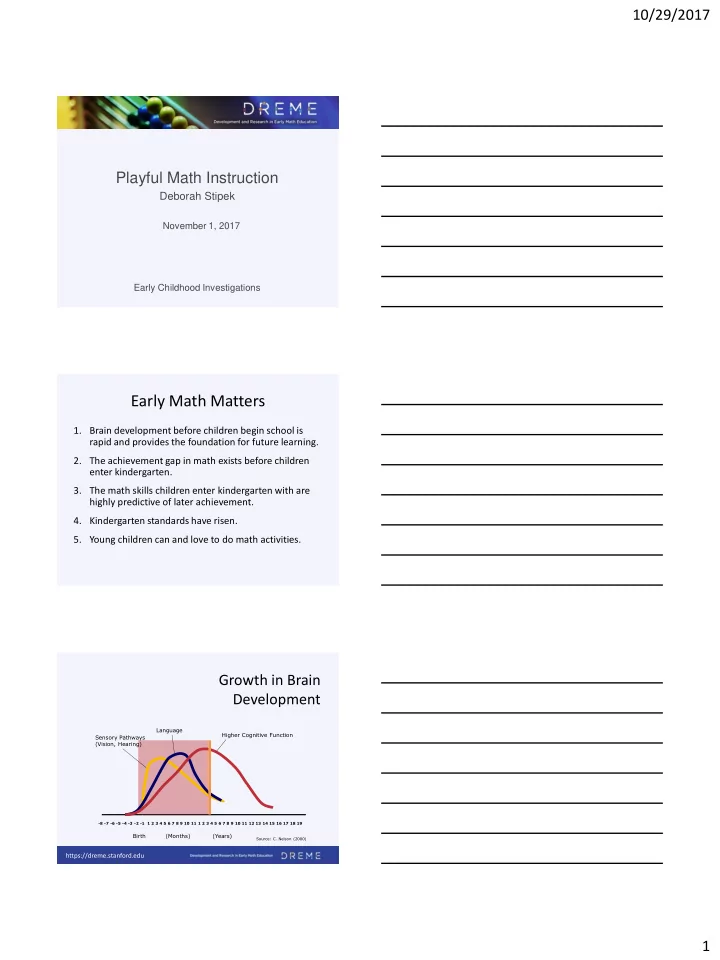

10/29/2017 Playful Math Instruction Deborah Stipek November 1, 2017 Early Childhood Investigations Early Math Matters 1. Brain development before children begin school is rapid and provides the foundation for future learning. 2. The achievement gap in math exists before children enter kindergarten. 3. The math skills children enter kindergarten with are highly predictive of later achievement. 4. Kindergarten standards have risen. 5. Young children can and love to do math activities. Growth in Brain Development Language Higher Cognitive Function Sensory Pathways (Vision, Hearing) -8 -7 -6 -5 -4 -3 -2 -1 1 2 3 4 5 6 7 8 9 10 11 1 2 3 4 5 6 7 8 9 10 11 12 13 14 15 16 17 18 19 Birth (Months) (Years) Source: C. Nelson (2000) https://dreme.stanford.edu 1
10/29/2017 Brain Development for Executive Functions Skill proficiency Birth 3 5 10 15 25 30 50 70 80 Age (Years) Weintraub, et al., (2011) https://dreme.stanford.edu Math Knowledge in American 4-yr-olds 100 90 Mean Percent Correct 80 70 60 50 40 Low Income 30 Middle Income 20 10 0 https://dreme.stanford.edu Math Achievement Scores of Kindergartners Followed Through Grade 8, by Kindergarten Score Quartile 180 160 157 144 140 140 123 123 120 120 100 101 98 80 79 78 60 61 Highest quartile 46 Middle two quartiles 40 38 Lowest quartile 25 20 17 0 Fall 1998, Spring 2000, Spring 2002, Spring 2004, Spring 2007, Kindergarten grade 1 grade 3 grade 5 grade 8 https://dreme.stanford.edu 2
10/29/2017 Effect of Persistent vs. No Problems at Ages 6, 8, and 10 on High School Completion and College Attendance Persistent High School College Problems in … Completion Attendance Reading -.05 -.06 Math -.13* -.29** Antisocial Behavior -.10*** -.24* https://dreme.stanford.edu Common Core Kindergarten Standards • Count to 100 by ones and by tens • For any number from 1 to 9, find the number that makes 10 when added to the given number • Compose and decompose numbers from 11 to 19 into ten ones and ones • Describe measurable attributes of objects, such as length or weight. • Compose simple shapes to form larger shapes. • Directly compare two objects with a measurable attribute in common, to see which object has "more of"/"less of" the attribute, and describe the difference. POLL 3
10/29/2017 Kindergarten is the New First Grade https://dreme.stanford.edu But not much Math Happening in Preschools Proportion of Time Spent in Preschool Content Areas Music and/or Mixed Content Movement 3% Morning Routine 20% Art < 1% Social Studies 1% 1% Other (e.g. TV) Science < 1% 1% Math Reading 3% 2% Code-Based Skills 2% Reading Readiness 11% Literacy 7% Meal/Nap/Out/ Transition 60% POLL 4
10/29/2017 Agree Strongly No Exp/No Edu Agree Agree 2+ Yrs Exp/4 Yrs ECE Somewhat Edu 2+ Yrs Exp/4+ Yrs Edu & Math Ed Course Math activities are age-appropriate for preschoolers. Platas, 2011 https://dreme.stanford.edu POLL Complaints about Standards 1. Focus attention on basic academic skills and away from other important dimensions of development 2. Encourage developmentally in appropriate teaching 3. Undermine the joy of learning 5
10/29/2017 No Standards? • If we don ’ t know our destination, how do we know how to get there? – How do we determine whether children are making progress? Standards can be useful if they … • guide but don ’ t dictate instruction – Standards provide the long-term goals; the short-term goals (in route) are based on what children know and understand • inform assessments used to track children ’ s progress • inform choice of curriculum used to provide scope and sequence for learning – Rebel against strict pacing!! But what about “teaching”? 6
10/29/2017 “Teaching” has a bad rap ▪ associated with teacher-directed, didactic instruction — flash cards and worksheets ▪ believed to interfere with children ’ s natural curiosity and joy of learning ▪ and competes with: ▪ time for play ▪ opportunities to develop social-emotional skills Theories of Teaching Child-Centered Teacher-Directed (constructivist) (learning theory) Children learn Children discover what teachers through direct teach experience Teachers choose Children choose Performance stressed Process stressed Work Play POLL 7
10/29/2017 What is not included • Rote counting • Calendar • Worksheets • Macaroni math Effective, Playful Math Instruction • Teacher plans activities with clear learning goals • Identifies, designs, and prepares materials • Provides direction • Engages children in conversation • Assesses learning • Designs individual & group interventions Teacher Verbal Behavior (talk by teacher during the 3.25 hour learning opportunity) All Classrooms: Teacher Talking and to Whom To Child 35% Not Talking or Listening 20% To Small Talking Group 71% 7% To Whole Group 25% To Self Listening 1% 9% To Teacher To Parent/External Adult 2% 1% Farran, ECMC 8
10/29/2017 Child Verbal Behavior (Talk by children during the 3.25 hour learning opportunity) All Classrooms: Children Talking and to Whom Listening Fuss/Cry 34% 1% To Teacher 4% To Child 9% Talking To Small Group 24% 1% To Whole Group 4% To Self 6% Not Talking or Listening 41% Farran, ECMC • http://pbskids.org/lab/activity/shoesorting/ Other Activities Letters in name T I M S A R A H • Shape hunt Map of classroom Store 9
10/29/2017 Making Counting Fun Using Picture Books Describe, Draw, Describe 10
10/29/2017 Games Teachable Moments • Take advantage • But not sufficient – depends too much on chance 11
10/29/2017 To learn more about our research and development in early math, visit our website at https://dreme.stanford.edu To access our free early math resources for teacher educators (videos, articles, activities), visit DREME TE at http://prek-math-te.stanford.edu 12
Recommend
More recommend